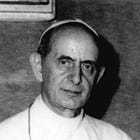'I do not hesitate to administer conditional confirmation when asked'—Archbishop Lefebvre
Archbishop Marcel Lefebvre wrote to Abbé François Pivert in 1988, explaining his rationale and willingness to confirm conditional confirmation freely, for the sake of the faithful

Archbishop Marcel Lefebvre wrote to Abbé François Pivert in 1988, explaining his rationale and willingness to confirm conditional confirmation freely, for the sake of the faithful
Editor’s Notes
Below is a brief letter from Archbishop Marcel Lefebvre to Abbé François Pivert, dated 25 April 1988, addressing his long-standing and much-contested practice of conditionally repeating the sacrament of Confirmation for those previously confirmed in the Novus Ordo rite, reformed under Paul VI.
Abbé Pivert has provided the original French version (which we have included following our translation) and confirmed its authenticity.
This text illustrates Lefebvre's attitude towards the Novus Ordo sacramental rites and his pastoral concern for the faithful. The same attitude is seen in another letter that year to a certain Mr Wilson, regarding the necessity of conditionally ordaining/consecrating men who had been previously ordained/consecrated in the same new rites.
Grounds for doubt
Lefebvre identifies multiple serious and objective sources of doubt with regards to Confirmation: ambiguity in the vernacular translation of the form, the modernist corruptions of sacramental intention, and deviation from the traditional matter of olive oil.
The analysis which we have previously published identifies more comprehensive grounds for doubt, grounded in theological principles not addressed in this letter. With regards to the new form of Confirmation: while very similar, it is not identical with the form used in certain Eastern rites; further, the circumstances of the Vatican II reforms make it difficult (if not impossible) to conclude with certainty that this new form is sufficient for validity.
This is to say nothing of the other reasons for concern, including regarding the Holy Orders conferred in the new rites.1
Lefebvre’s pastoral practice
Nonetheless, the letter is very instructive. It demonstrates what we have argued elsewhere: that Lefebvre’s sacramental discipline was fundamentally pastoral. Although he does not treat the new rite as automatically invalid, he recognises the concerns of the faithful and responds with prudence and pastoral charity.
As early as the 1970s, Archbishop Lefebvre was defending this practice, stating:
“These parents have the right to be certain that their children are receiving the grace of Confirmation. This is, after all, a grave responsibility for parents. It is grace, which keeps the soul alive.”2
There are many other such statements, and they evidently apply equally to adults seeking conditional Confirmation, having previously been confirmed in the Novus Ordo milieu. This is further proven by the practice followed for decades by traditionalists.
In such statements, Lefebvre echoes the standards laid out by the moralists McHugh and Callan, who hold the conditional repetition of confirmation to be:
“Lawful” when there is a “prudent misgiving” about validity
“Gravely obligatory” when there is a “well-founded fear” of validity, “if charity, justice or religion calls for repetition and the inconvenience will not be too great.”3
There is no sense in their treatment that the minister repeating the sacrament conditionally must be convinced that the sacrament is doubtful himself. One can recognise the worth of arguments, of an objective state of doubt, or of the necessities of the common good, without personally embracing the doubt or conclusion of invalidity oneself. As McHugh and Callan add:
“Again, the Sacraments are for men, and hence, if man will likely be subjected to a notable loss by the minister’s neglect of repetition, the duty of repetition is clear.”
Although Lefebvre goes on to say that “It would be for the parents, where appropriate, to write to the dioceses,” he does not show a great deal of concern about this—nor has it historically been expected of those seeking conditional Confirmation.4
On the contrary, Lefebvre appears to be disclaiming his own responsibility for doing so, whilst also recognising that resolving these matters through investigations is a burdensome task which cannot be expected of the faithful. The difficulty is exponentially more complicated after the passage of over 35 years since the letter, and aggravated by concerns about the validity of the holy orders conferred in the Novus Ordo milieu.
Conclusion: The importance of Confirmation
We have already seen Lefebvre’s comments about parents’ right to certainty about the validity of their children’s Confirmation. Although it is true that Confirmation is commonly categorised as a “useful” sacrament, (rather than “necessary” or “more important,”) the letter also conveys Lefebvre’s high estimation of its importance, especially given the crisis in the Church:
“The sacrament is too important—especially today—to be neglected.”
In fact, ensuring valid administration of Confirmation was one of the stated reasons for his 1988 consecrations—as he wrote in a letter to the four candidates for the episcopate in 1987:
“The main purpose of my passing on the episcopacy is that the grace of priestly orders be continued, for the true Sacrifice of the Mass to be continued, and that the grace of the Sacrament of Confirmation be bestowed upon children and upon the faithful who will ask you for it.”5
He reaffirmed the general purpose of ensuring certainly valid sacraments for the faithful on several occasions in the lead up to 30 June 1988—and on the day of the consecrations itself, he said:
“You well know, my dear brethren, that there can be no priests without bishops. When God calls me – this will certainly not be long – from whom would these seminarians receive the sacrament of Orders? From conciliar bishops, who, due to their doubtful intentions, confer doubtful sacraments? This is not possible. […]
“And they came to our seminaries, despite all the difficulties that they have encountered, in order to receive a true ordination to the priesthood, to say the true Sacrifice of Calvary, the true Sacrifice of the Mass, and to give you the true Sacraments, true doctrine, the true catechism. This is the goal of these seminaries.
“So I cannot, in good conscience, leave these seminarians orphaned. Neither can I leave you orphans by dying without providing for the future. That is not possible. It would be contrary to my duty.”6 [Emphases added]
While Archbishop Lefebvre’s focus here differs somewhat from that which we have published previously—in that our position develops more fully the consequences of the principles he identifies—the conclusion is the same, and broadly supports the same general thesis argued here:
With thanks to Abbé Pivert for permission to publish this letter. His website is available here.
Archbishop Marcel Lefebvre’s Letter to Abbé Franćois Pivert
On Conditional Repetition of Confirmation
+ Ecône, 25 April 1988
Dear Abbé Pivert,
Indeed, the sacrament of Confirmation is perhaps the one which currently poses the greatest problems with regard to its validity.
In Rome, we are reproached for administering conditional confirmations, to which we respond that we understand the parents’ doubts:
Because of the doubtful validity of the translation of the new Latin form, which is “accipe sigillum Spiritus Sancti” (“Receive the seal of the Holy Ghost”). What matters is the “sigillum” (seal). How is it translated? Is it always translated? “Receive the mark” would be clearer than“Be marked”. But it sometimes happens that they simply say: “Receive the Holy Ghost,” which is certainly invalid. If “sigillum” is well translated, there would be no doubt about the form.7 Otherwise, there is doubt.
There is also now the question of intention. Bishop Bontemps stated in his Semaine religieuse de Chambéry: “Confirmation does not give the Holy Ghost, but makes one aware of the Holy Ghost received at baptism.” His confirmations are not valid.8
Are there many who now think this way?
The matter is also a cause for concern. The tradition of olive oil is such that one may truly doubt the validity of any other vegetable oil. Twenty centuries of usage, Rome’s reprimands against other oils, the prayers of consecration all composed for olive oil, the general consensus of moralists, of the Catechism of the Council of Trent, all compel us to believe that this matter is of divine institution and forms part of the substance of the sacrament.
It is possible, though not certain, that many bishops use olive oil, especially in countries where the olive tree grows.
Here, then, are many grounds for doubt – and difficult to verify, unless one writes to the dioceses to ask what is the form and what is the matter of the sacrament of Confirmation.
That is why I do not hesitate to administer conditional confirmation when asked to do so. The sacrament is too important—especially today—to be neglected.
It would be for the parents, where appropriate, to write to the dioceses.
I hope I have answered you sufficiently.
Yours sincerely in Christ and Mary,
+ Marcel Lefebvre.
Lettre de Monseigneur Marcel Lefebvre à l’abbé François Pivert
Sur la Répétition Conditionnelle de la Confirmation
+ Ecône, le 25 avril 1988
Cher Monsieur l’abbé Pivert,
En effet, le sacrement de la Confirmation est peut-être celui qui pose le plus de problèmes actuellement, en ce qui concerne sa validité.
A Rome on nous reproche les confirmations sous condition, ce à quoi nous répondons que nous comprenons les doutes des parents :
1° pour la validité douteuse de la traduction de la forme nouvelle latine qui est « accipe sigillum Spiritus Sancti ». Ce qui importe, c’est le « sigillum ». Comment est-il traduit ? Est-il toujours traduit ? « Reçois la marque » serait plus clair que « sois marqué ». Mais il arrive qu’il est tout simplement dit : « Reçois le Saint-Esprit », ce qui est certainement invalide. Si « sigillum » est bien traduit, il n’y aurait pas de doute sur la forme. Autrement il y a doute.
Il y a aussi désormais l’intention. Mgr Bontemps a affirmé dans sa Semaine religieuse de Chambéry : « La confirmation ne donne pas le Saint-Esprit, mais fait prendre conscience du Saint-Esprit reçu au baptême. » Ses confirmations ne sont pas valides. Sont-ils nombreux à penser cela désormais ?
2° La matière est aussi un sujet d’inquiétude. La tradition de l’huile d’olive est telle qu’on peut vraiment douter de la validité d’une autre huile végétale. Vingt siècles d’usage – les réprimandes de Rome contre les autres huiles – les prières de la consécration toutes rédigées pour l’huile d’olive, le consensus général des moralistes, du Catéchisme du concile de Trente – nous obligent à penser que cette matière est d’intention divine et fait partie de la substance du sacrement.
Il est possible, mais non certain, que beaucoup d’évêques utilisent de l’huile d’olive, surtout dans les pays où pousse l’olivier.
Voilà bien des sujets de doute et difficilement contrôlables, sauf à écrire aux évêchés pour demander quelle est la forme et quelle est la matière du sacrement de confirmation.
C’est pourquoi je n’hésite pas à confirmer sous condition lorsqu’on me le demande. Le sacrement est trop important, aujourd’hui surtout, pour qu’on le néglige.
Ce serait aux parents d’écrire éventuellement aux évêchés.
J’espère vous avoir répondu suffisamment.
Bien vôtre in Christo et Maria,
+ Marcel Lefebvre.
HELP KEEP THE WM REVIEW ONLINE WITH WM+!
As we expand The WM Review we would like to keep providing free articles for everyone.
Our work takes a lot of time and effort to produce. If you have benefitted from it please do consider supporting us financially.
A subscription gets you access to our exclusive WM+ material, and helps ensure that we can keep writing and sharing free material for all.
(We make our WM+ material freely available to clergy, priests and seminarians upon request. Please subscribe and reply to the email if this applies to you.)
Subscribe to WM+ now to make sure you always receive our material. Thank you!
For our study of Archbishop Lefebvre’s long-standing and well-documented pastoral approach to the matter of conditional Confirmation, see below:
See the full index on this matter here:
Follow on Twitter, YouTube and Telegram:
English base text translated by AI, each line scrutinised by a human.
In 2014, Fr Álvaro Calderón published an study of the new rite of consecration, and concludes that “the positive and objective defects” of the new rite “prevent certainty of its validity” and therefore “justify and make necessary the conditional reordination of priests consecrated by new bishops and, if necessary, the conditional reconsecration of these bishops.” This is because, as Calderón says, “Such uncertainties cannot be tolerated at the very root of the sacraments.”
Further, even the much-cited study of Fr Pierre-Marie Kergorlay OP—which purports to prove the validity of this new rite of episcopal consecration—maintains that the proof applies solely to the Latin form “as it was published by the Vatican” and not to “the different translations and adaptations of the official rite.” Pierre-Marie talks of investigations into each individual case, and acknowledges that “the difficulty of the thing” means that conditional ordination/consecration is a “prudential measure” which “seems to prevail among traditionalists.”
As such, there remain objections to the validity of the new rites of holy orders which have not been answered, let alone with moral certainty; therefore, doubts about confirmation based on these concerns are not negative doubts, even in the absence of evidence for a particular minister.
Lefebvre, ‘The Holy Sacrifice of the Mass’, An Address Given by His Grace: Ottawa, Canada November 1975. http://www.sspxasia.com/Documents/Archbishop-Lefebvre/The-Holy-Sacrifice-of-the-Mass.htm
Repetition of a Sacrament on Account of Invalid Administration.
(a) This is unlawful when the fear of invalidity is groundless and foolish; for it is seriously disrespectful to a Sacrament and disedifying to others to repeat the rite without reason. But scrupulous persons are sometimes free of grave sin, since they mean well in repeating and are not accountable for their fears.
(b) This is lawful but not obligatory when there is a prudent misgiving about a useful Sacrament (Confirmation, Matrimony, anointing of one who is conscious); also when there is a slight reason of law or fact for fear about a necessary or more important Sacrament (Baptism, Orders, absolution of a dying person, anointing of an unconscious person, consecration of the Eucharist). For the Sacraments are for men. But if only a small loss or an unlikely loss will be caused by their non-repetition, the duty of repeating them cannot be insisted on.
(c) This is gravely obligatory when there is a prudent fear about a necessary or more important Sacrament; it is gravely or lightly obligatory (to be determined in each case) when there is a well-founded fear about a useful Sacrament, if charity, justice or religion calls for repetition and the inconvenience will not be too great. In Matrimony the alternate methods of convalidation or sanation may be used as the case demands. Again, the Sacraments are for men, and hence, if man will likely be subjected to a notable loss by the minister’s neglect of repetition, the duty of repetition is clear.
John A. McHugh, O.P. and Charles J. Callan, O.P., Moral Theology: A Complete Course Based on St. Thomas Aquinas and the Best Modern Authorities, n. 2682
The brief period of talking in such terms in 1983 is a definite outlier, prompted by external events, and then swiftly abandoned. Such investigations were not seriously expected or enforced, and the principle is strongly contradicted in the periods before and after the consecrations.
Bernard Tissier de Mallerais, Marcel Lefebvre: The Biography, p 626. Trans. Brian Sudlow, Angelus Press, Kansas City MO, 2004.
For more on why this conclusion is problematic, see below:
Lefebvre’s treatment of the topic of intention also may be problematic. This topic is addressed below:







